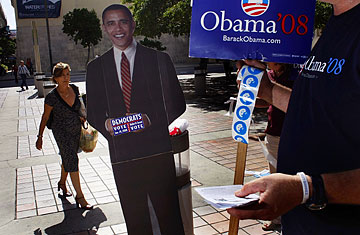
A cardboard cutout of Democratic presidential hopeful Barack Obama outside an early voting center in Miami, Florida, Jan. 18, 2008
There is one upside to the Democratic presidential candidates' pledge not to campaign in Florida before Tuesday's primary election: it means one less petty political donnybrook in the increasingly nasty race between Hillary Clinton and Barack Obama. But for Democrats, it's hard to find any other silver lining in the fact that their eventual nominee will have no primary face time with voters in such a crucial swing state. "I don't think there is any real chance the Republicans can win the presidency in November without taking Florida," says Steve Geller, a Florida Democrat and the state's Senate minority leader. "But the Democratic Party shouldn't be taking that risk when just eight years ago the whole nation was agonizing over 500 votes in Florida."
The Democrats are taking that possibly ill-advised risk because Florida stunned the nation last year when it leapfrogged its primary from March to January. It was an act of rebellion against what the state called an archaic system that gives the traditionally early primaries, especially in small states like Iowa and New Hampshire, inordinate influence in determining presidential nominees. But the shift also violated Democratic National Committee rules — and prompted the DNC to declare that it would not seat Florida's 210 delegates at the party's convention next August in Denver, essentially declaring that Florida's primary wouldn't count. That also led Clinton, Obama, John Edwards and other Democratic hopefuls to sign a pact not to stump on the peninsula for the primary. (They signed a similar pledge for Michigan, which also jumped the Feb. 5 Super Tuesday primaries and held its primary Jan. 15. But unlike Michigan, all three major Dems are on the ballot in Florida.)
Like Geller, most Florida Dems are furious with the DNC ruling; U.S. Senator Bill Nelson even sued the DNC last year, but lost. But many also believe the DNC is bluffing — that the eventual nominee, not wanting party divisions to spoil his or her convention moment, and not wishing to exclude the nation's fourth largest state from that moment, will pressure party leaders to include Sunshine State delegates. "At the end of the day, there is no way the DNC is not going to seat our delegates," says Ana Cruz, a Clinton campaign organizer in Tampa. "The nominee is going to have a big say in that." Says State Senator Nan Rich, a Clinton backer in South Florida: "The eventual nominee will have a big influence on the [convention] rules and will not allow Florida voters to be disenfranchised."
For her part, Clinton agrees, and as the weekend wore on, she looked to some observers to be dangerously close to breaking her pledge not to campaign in Florida. On Friday, she issued a statement pledging to request that Florida and Michigan delegates be seated if she's the presumptive nominee going into the convention. "I believe our nominee will need the enthusiastic support of Democrats in these states to win the general election," she said. Then on Saturday, soon after she suffered a humbling defeat to Obama in South Carolina, her husband told an evening rally in Missouri that the campaign was now moving onto other contests, including, notably, Florida. By Sunday, Clinton told reporters she would make a public appearance in Florida once the polls close Tuesday night to thank supporters and "make sure their voices are heard."
Clinton's stance on the delegates, not surprisingly, is not exactly an act of courage, or for that matter, principle. As the only major Democrat who didn't remove her name from the ballot, she easily won Michigan, and she leads Obama by more than 20 points in most Florida voter polls; if she's the presumptive nominee, welcoming Florida's delegates to the convention will simply pad her victory margin. The tougher call would be for Obama to issue the same promise: should he lose Florida but arrive in Denver as the presumptive nominee, calling on the DNC to include the state's delegates could theoretically cost him the nomination.
Which is perhaps why the Obama campaign seems resigned to the DNC decision that Florida's primary results, like Michigan's, will not count. It issued a statement this month assuring supporters that "neither the Florida nor Michigan primaries are playing any role in deciding the Democratic nominee." Obama's Florida campaign chairman, U.S. Representative Robert Wexler says, "I too detest the DNC ruling" and that he believes that "whoever the presumptive nominee is will seat the delegation from Florida." But he insists that those delegates would simply be there to declare their backing of an already anointed nominee and would still play no role in the selection of that nominee. "It's not the Obama campaign saying that — those are simply the facts," says Wexler, referring to the DNC ruling.
Others blast the DNC ruling for what they call its hypocrisy: it still allows candidates to attend fund raisers in Florida, essentially telling the state that while the party won't take Florida's delegates, it's more than happy to take its cash. Clinton herself was scheduled to hold two such events in Miami Beach on Sunday, one of them a $2,300-a-head reception hosted by a developer, though neither is open to the press or public.
